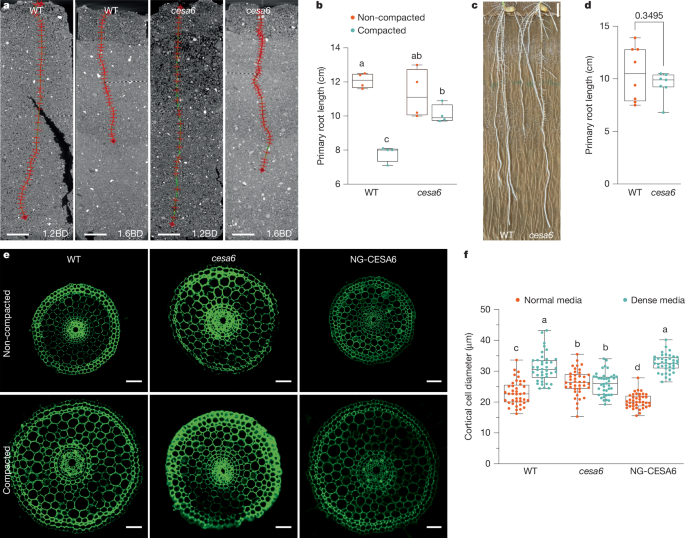
"The reliance of modern agriculture on mechanization is causing soil degradation and compaction, which affect root growth and crop yield1. Plant roots expand radially when encountering compacted soil conditions, leading to shorter and thicker roots3. Radial root swelling is mainly due to expansion of cortex cell layers4 that can cause soil fissures that aid soil penetration3,5. This adaptive response is driven by entrapment of the plant volatile hormone ethylene"
"Primary plant cell walls, and in particular the organization and amount of the load-bearing polymer cellulose, support anisotropic cell expansion and are key to organ growth7. Cellulose is produced at the plasma membrane by large, multimeric protein complexes known as CESA complexes (CSCs)8. In rice, OsCESA1, OsCESA3, OsCESA5, OsCESA6 and OsCESA8 form heterotrimeric CSCs that are active in growing root cells during primary wall synthesis9. When roots encounter soil compaction, the arrangement of cellulose microfibrils in their cortical cell walls"
Mechanization-driven soil compaction degrades soil and impedes root growth, causing roots to become shorter and thicker. Radial root swelling arises mainly from expansion of cortex cell layers, which can create soil fissures that aid penetration. Compaction reduces gas diffusion, entrapping ethylene around roots and driving this adaptive swelling. Primary cell wall composition, especially cellulose amount and microfibril organization, governs anisotropic cell expansion. Cellulose is synthesized by plasma-membrane CESA complexes; in rice, OsCESA1, OsCESA3, OsCESA5, OsCESA6 and OsCESA8 form active heterotrimers in growing root cells. Altered cellulose organization occurs when roots encounter compacted soil.
Read at Nature
Unable to calculate read time
Collection
[
|
...
]